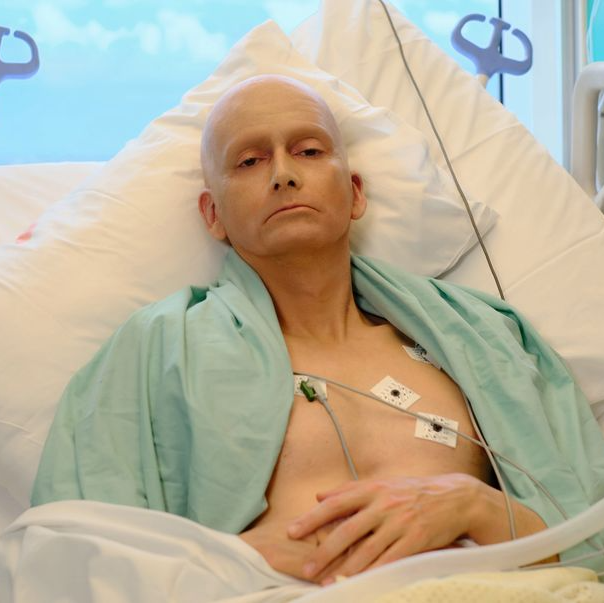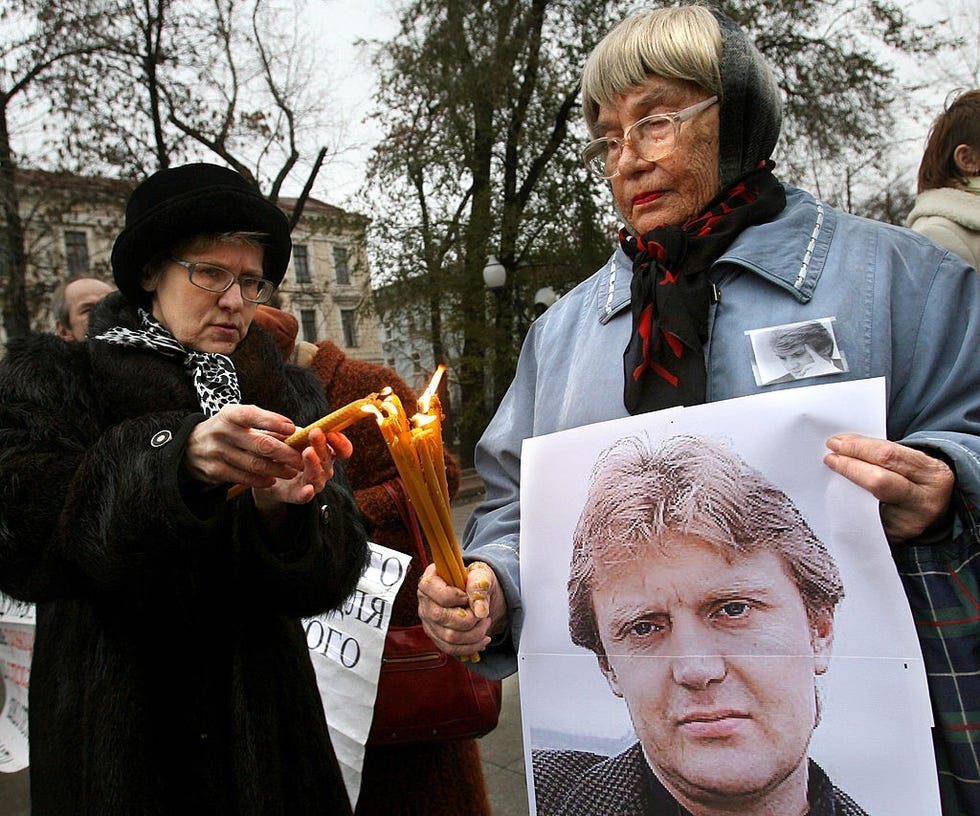Of all the roles David Tennant has played in his life, from the Time Lord himself in Doctor Who to Crowley in Good Omens, one of the most shocking came when the first-look pictures dropped for Litvinenko.
Tennant, bald-headed and languishing in a hospital bed, had taken on the appearance of Alexander Litvinenko, a Russian man who was killed by radiation poisoning in London in 2006, in a story that shocked the world.
But as Tennant gears up to replay the assassination in the new four-part dramatisation for ITV, what really happened in the case of Litvinenko?
The backstory
A preliminary point: if you want the complicated and chaotic nature of Russian history and politics explained, may we suggest digging into Adam Curtis’ Russia 1985-1999: TraumaZone on BBC iPlayer as a precursor to Litvinenko?
The story of Litvinenko himself starts at the height of some of the former Soviet Union’s troubles, when in 1986, aged 24 after graduating and serving as a platoon commander in the Dzerzhinsky Division of the Soviet Ministry of Internal Affairs, he moved into counter-intelligence for the KGB, where he worked until the USSR collapsed in 1991.
That same year, he was promoted to the Russian Federal Counterintelligence Service (FSK/FSB, a renamed version of the KGB) where he specialised in counter-terrorist activities and infiltration of organised crime.
In 1997, Litvinenko was promoted to the FSB Directorate of Analysis and Suppression of Criminal Groups but he began to uncover corruption at the heart of its own system. He was first introduced to Vladimir Putin – then director of the FSB – by the oligarch Boris Berezovsky. According to Death of a Dissident: The Poisoning of Alexander Litvinenko and the Return of the KGB by Alexander Goldfarb and Marina Litvinenko (Litvinenko’s widow), Litvinenko tried to inform Putin about the corruption, only for Putin to dismiss it, and Litvinenko later told his wife: “I could see in his eyes that he hated me.”
In 1998, Litvinenko and four other FSB colleagues went public with claims in a press conference that their bosses had ordered the assassination of Berezovsky, as well as other prominent members of Russian politics and society. Litvinenko was later sacked, arrested and told not to flee Moscow.
But in October 2000, Litvinenko and his family escaped to Turkey and tried to claim asylum in Ankara, where he was denied. A month later, he asked for political asylum in Heathrow Airport, which was granted in May 2001.
While in the UK, he became outspoken against Russia, joining forces with Berezovsky to campaign openly against the Russian government. As reported by The Guardian, the inquest into Litvinenko’s death revealed: “The British special intelligence service recruited him as an informant in 2003, two years after he fled to London. MI6 put Litvinenko on its payroll, gave him an encrypted phone and assigned him a minder, ‘Martin’. In return, Litvinenko passed on useful information about senior Kremlin figures and their links with Russian organised crime.”
Litvinenko moved to Whitehaven, followed by Muswell Hill, and in October 2006, he officially became a British citizen.
The assassination
On 1 November, 2006, Litvinenko met with two former agents, Dmitry Kovtun and Andrey Lugovoi, at London's Millennium Hotel’s Pine Bar, where he was offered and drank a few sips of green tea from a teapot. He then met another contact in the Piccadilly branch of Itsu that afternoon, before going back to meet Kovtun and Lugovoi in the hotel once again.
Later that day, he fell violently ill, and on 3 November, he was admitted to Barnet General Hospital, then moved to the ICU in University College Hospital. He had been poisoned with radionuclide polonium-210, a rare and toxic element.
While on his deathbed, according to Reuters, Litvinenko was able to give interviews to authorities, and he claimed that Putin had directly ordered his assassination.
On 22 November, Litvinenko's medical team at University College Hospital reported Litvinenko had suffered a “major setback” due to either heart failure or an overnight heart attack. Two days earlier, the now infamous pictures of Litvinenko dying in a hospital bed were released at his request. He told Lord Bell, a friend: “I want the world to see what they did to me.” He died on 23 November, three weeks after first ingesting the poison, and was buried in a lead-lined coffin in Highgate Cemetery in December 2006, and it officially became a murder case.
The aftermath
In a 2016 UK public inquiry into Litvinenko’s murder, it named the two Russian agents, Andrei Lugovoi and Dmitry Kovtun as the suspects. Detectives in the case found polonium in all the hotel rooms where Kovtun and Lugovoi had stayed in London, as well as on Lugovoi’s plane seat from Moscow and in numerous other locations including at Arsenal’s Emirates stadium.
According to the BBC: “For many years, they have been the two chief suspects. Mr Lugovoi had been in the FSB and the federal protection service, and continued to have strong links to the FSB. The Russian pair had tried to poison Mr Litvinenko almost a month earlier at a London office of multinational security company, Erinys, the report said. They knew they were using a deadly poison, but did not know precisely which chemical.”
The inquiry chair, Sir Robert Owen, was reported in The Guardian as saying there was “strong circumstantial case” that the Russian state was behind the assassination. As per the BBC, he added: “I am satisfied that in general terms, members of the Putin administration, including the president himself and the FSB, had motives for taking action against Litvinenko, including killing him, in late 2006."
Meanwhile, in 2021, The European Court of Human Rights ruled that Russia was responsible for the killing of Litvinenko and ordered Moscow to pay €100,000 (£85,000) in non-pecuniary damages to his widow, Marina Litvinenko.
Lugovoi and Kovtun fled back to Russia, and the Kremlin has always refused to extradite the men to face trial in the UK, as they deny all charges. Lugovoi went on to become a prominent politician in the State Duma for the Liberal Democratic Party of Russia, while Kovtun died of Covid in 2022.
Litvinenko starts on ITV on 15 December.














